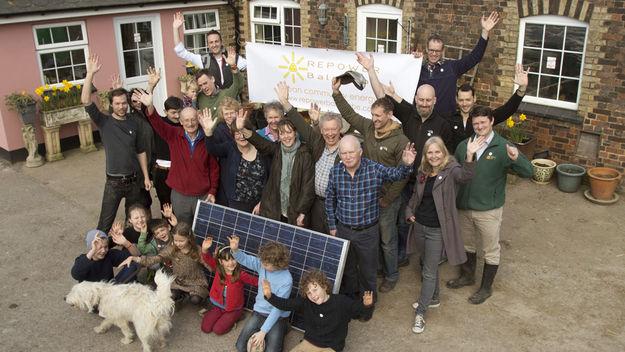Futures Forum: Sunshine revolution: the age of solar power
But not if you're in the UK:
Futures Forum: Britain's boom-and-bust in solar power >>> cutting the Feed-in-Tariff and cutting investment in community energy schemes
As reported in the Financial Times this week:
On Friday, a community group in Sussex cancelled its plans to build a solar farm large enough to power the village of Balcombe, citing the Treasury’s unexpected removal of tax relief for investors.
Tax incentive axed for local energy projects - FT.com
With a little context provided, also by the FT:
The “battle of Balcombe”, set in a verdant and well-heeled Sussex village last summer, illustrates popular opposition to the industry in the Tory heartlands.
With a little context provided, also by the FT:
The “battle of Balcombe”, set in a verdant and well-heeled Sussex village last summer, illustrates popular opposition to the industry in the Tory heartlands.
Can I make a fortune from fracking? - FT.com
This is the message today from the Back Balcombe campaign:
Back Balcombe
With a report from Channel Four:
_LRG.jpg)
_MED.jpg)
More on this story
Joy turns to bitter disappointment in anti-fracking Balcombe - Channel 4 News
See also:
Futures Forum: Balcombe: community-owned solar park given go-ahead
Futures Forum: Where should we put solar panels? In fields or on roofs?
Futures Forum: "The fracking village is going 100% solar"
Futures Forum: Community energy schemes to lose tax relief ... incentives which have 'propelled the transformation of the German energy market'
.
.
.
This is the message today from the Back Balcombe campaign:
|
|
Back Balcombe
With a report from Channel Four:
Joy turns to bitter disappointment in
anti-fracking Balcombe
A last-minute change to tax relief is the final straw for community involvement in a flagship project in the Sussex village of Balcombe, and it's not the only community energy scheme under threat.
_LRG.jpg)
Following high-profile protests against possible fracking in the area, in the two years since Balcombe residents set up a community energy scheme they have already installed solar panels on two local primary schools and a farm building.
Their eventual aim was to become entirely self-sufficient through community-owned solar power projects.
Less than a month ago they were joyfully celebrating the decision of their Conservative-led council to grant planning permission for a 18,500-panel, 5-megawatt solar farm.
But last week, a sudden and unexpected withdrawal of tax relief in an amendment to a finance bill now going through parliament was the final straw for community ownership of the project.
It's bitterly disappointing that it won't be a community-run projectJoe Nixon, Repower Balcombe
As the solar farm already has planning permission, it will go ahead, but it will now be a commercial developer, not the community in the driving seat.
Joe Nixon of Repower Balcombe said: "The policy situation simply meant we were haemorrhaging investor confidence.. it's bitterly disappointing that it won't be a community-run project, because we don't just need to decarbonise our energy system, we need to give people more of a say in it."
The constant changes in government policy in the past few months has left Tom Parker, also a director at Repower Balcombe, frustrated and angry at a government that once championed volunteering and the Big Society: "either they haven't got a clue about business, or they are trying to destroy the community energy sector," he told Channel 4 News.
"If we had the same rules for fracking as for solar, we would have been able to go ahead," he added.
'Kick in the teeth'
Balcombe is not the only scheme finding the new policy environment challenging.
_MED.jpg)
In the last few days the Abingdon Community Hydroproject in Oxfordshire has ceased, after directors reluctantly concluded that "finances and the clock were against us", and the Mapledurham Community Anerobic Digestion project near Reading has folded.
The Bristol Energy Cooperative (BEC) is not closing.
The voluntary organisation aims to invest £10m in solar farms and solar rooves in the Bristol area. But it has only just launched a share offer intended to raise £2.8m and the government's unexpected changes to the tax relief on offer to such schemes mean that they now face the challenging prospect of having to get the money in by 23 November.
Coupled with reductions in the level of feed-in tariffs paid for generating renewable energy, BEC Chair Peter Thompson told Channel 4 News this is the last chance for their current business model. He predicts that "community solar projects of this type are simply going to be unfeasible".
As a volunteer, he is dismayed by what he calls the government's "short-sighted" approach, saying "I take comfort in what we have done, but this feels like a kick in the teeth.
"We are doing what we can to deal with climate change and fuel poverty. This is simply not helping."
The government says policy changes are intended to reduce energy bills for consumers, adding that previous subsidies have already "driven down the cost of renewables significantly". It insists that "as costs continue to fall it becomes easier for parts of the renewables industry to survive without subsidies."
Article Tags
Joy turns to bitter disappointment in anti-fracking Balcombe - Channel 4 News
See also:
Futures Forum: Balcombe: community-owned solar park given go-ahead
Futures Forum: Where should we put solar panels? In fields or on roofs?
Futures Forum: "The fracking village is going 100% solar"
Futures Forum: Community energy schemes to lose tax relief ... incentives which have 'propelled the transformation of the German energy market'
.
.
.





_MED.jpg)
No comments:
Post a Comment